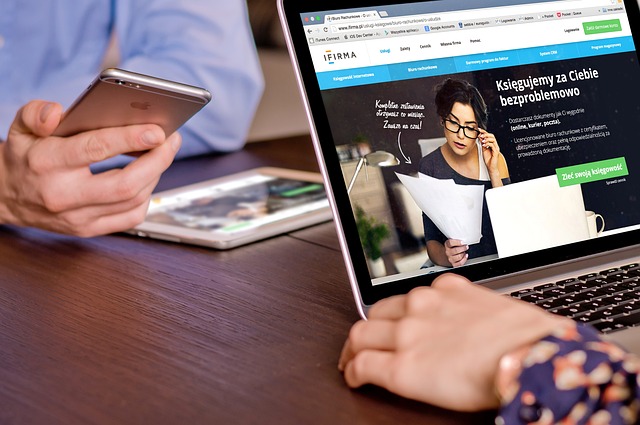Small business web designers are key in today's digital world, providing affordable and high-quality website solutions. They cater to limited budgets while creating unique, visually appealing, and optimized sites for entrepreneurs. These designers empower startups and small businesses to establish strong online presences, attract customers, and drive growth without breaking the bank. Choosing the right designer involves thorough research, examining portfolios, reading reviews, and understanding their process and pricing. Cost-effective strategies like DIY platforms and outsourcing can also help small businesses create professional websites efficiently. Measuring success involves tracking KPIs related to lead conversion and marketing effectiveness.
Entrepreneurs today need affordable web design more than ever. A professional website is no longer a luxury but a necessity for small businesses to thrive in the digital landscape. This article explores the growing importance of accessible web design for startups, understanding budget constraints, benefits of having a strong online presence, and practical tips on finding the right designer and cost-saving strategies without compromising quality. We’ll also showcase free and low-cost tools and guide you through DIY options and key performance indicators to measure success.
The Growing Need for Affordable Web Design: Why Small Businesses Matter

The need for affordable web design has never been greater, especially among small businesses. In today’s digital era, having an online presence is crucial for entrepreneurs to reach a wider audience and compete in the market. Small business web designers play a pivotal role in making this possible without breaking the bank. Many startups and established small businesses often have limited budgets, yet they understand the value of a well-designed website in attracting customers and conveying professionalism.
By offering cost-effective solutions, small business web designers enable entrepreneurs to create visually appealing and functional websites that enhance their brand image. These designers often tailor their services to meet specific needs, ensuring that each site is unique and reflects the client’s individual style and target audience. This personalized approach makes it possible for small businesses to stand out in a crowded online space without sacrificing quality or functionality.
Understanding the Budget Constraints of Entrepreneurs

Entrepreneurs often face unique financial challenges, especially when it comes to allocating resources for their business’s online presence. Small business web designers understand these budget constraints and offer tailored solutions that fit within tight budgets without compromising quality. Many startups and small businesses lack the substantial marketing budgets of larger corporations, making cost-effective web design even more critical.
By leveraging user-friendly content management systems (CMS) and streamlined design methodologies, small business web designers create visually appealing and functional websites at a fraction of the cost traditionally associated with web development. This accessibility empowers entrepreneurs to focus their limited resources on other vital aspects of their business while still establishing a strong online presence that attracts customers and drives growth.
Benefits of a Professional Website for Small Businesses

Having a professional website is no longer a luxury but a necessity for small businesses in today’s digital landscape. Small business web designers play a pivotal role in creating online presences that not only showcase products and services but also foster trust and credibility with potential customers.
A well-designed website acts as a 24/7 virtual storefront, enabling entrepreneurs to reach a broader audience, increase brand visibility, and generate leads. It provides a platform to effectively communicate the unique value proposition of the business, build relationships with clients, and ultimately drive sales. By investing in a professional site, small businesses can enhance their online presence, compete with larger corporations, and thrive in an increasingly digital market.
Finding the Right Small Business Web Designer: Tips and Tricks

When looking for a small business web designer, take your time and do thorough research. Consider their portfolio, checking if their designs align with your brand’s aesthetic and industry standards. Read client reviews to gauge their communication skills, responsiveness, and the overall quality of their work.
Ask potential designers about their process, how they handle revisions, and what level of support they offer post-launch. Choose a designer who is transparent about pricing, understands your budget constraints, and offers affordable packages tailored for small businesses without compromising on quality. Remember, a good relationship with your web designer is crucial for ongoing updates and maintaining your online presence effectively.
Cost-Effective Strategies for Web Design Without Sacrificing Quality

Small business web designers often face a tight budget but still need to create a strong online presence. Cost-effective strategies can help entrepreneurs achieve this goal without compromising on quality. One key approach is leveraging open-source tools and templates that are readily available and customizable, allowing for significant cost savings while ensuring a professional look.
Additionally, focusing on essential features rather than bells and whistles can streamline the design process. Prioritizing clear navigation, mobile responsiveness, and compelling content goes a long way in delivering an effective website. Outsourcing non-core tasks like graphic design or SEO optimization to freelancers or specialized agencies can also help reduce overhead costs while tapping into expert skills.
Popular Free and Low-Cost Web Design Tools and Platforms

Building a Basic Website: Do-It-Yourself Approaches for Entrepreneurs

Many entrepreneurs opt for building a basic website themselves as an affordable web design solution. This do-it-yourself approach is gaining popularity among small business web designers due to its cost-effectiveness and accessibility. With user-friendly website builders like WordPress, Wix, or Squarespace, creating a professional online presence has never been easier. These platforms offer drag-and-drop interfaces, allowing users to customize templates without coding knowledge.
By utilizing pre-designed themes, incorporating their branding elements, and adding essential pages such as ‘About Us’ and ‘Services’, entrepreneurs can quickly launch their websites. While this method may not be suitable for complex e-commerce sites or businesses requiring advanced functionality, it’s perfect for showcasing a portfolio, providing service information, or selling simple products. This DIY approach empowers entrepreneurs to take control of their online presence without breaking the bank.
Measuring Success: Key Performance Indicators for Small Business Websites

Measuring success for small business websites is a multifaceted endeavor. Key Performance Indicators (KPIs) specific to small business web designers should focus on converting visitors into leads and customers. The most relevant KPIs may include bounce rate—the percentage of visitors who leave your site after viewing only one page—and time spent on site, which indicates user engagement.
Converting visitors is paramount; tracking the number of forms filled out, product purchases made, or inquiries received directly from the website is essential for gauging effectiveness. Additionally, monitoring social media engagement and referral traffic can provide insights into the success of marketing efforts. By regularly analyzing these KPIs, small business web designers can make data-driven decisions to optimize their websites and better serve their clients.
